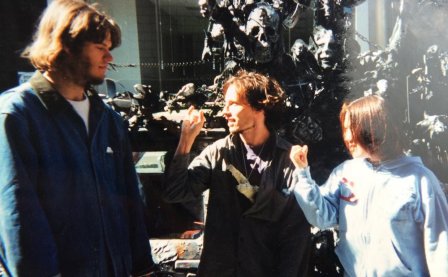Read a review of a Deerhoof record and count the references to childishness, whimsy, and play. That's not incidental to their appeal. Prog got the shit kicked out of it in the ’70s for being overserious. Deerhoof are a band's band -- they eat complicated music for a snack -- but, usually, they sweeten the deal with silly antics. If there's anything populist about them, it's that. But Deerhoof must have gotten tired of the characterizations, because Offend Maggie, the band's ninth album, shows a new seriousness about their aims.
The album is both heavier and more monochrome than 2007's Friend Opportunity. Here, Deerhoof clothe their twisting prog in slyly-subverted metal gestures. The keyboards are pushed to the back of the mix, and guitar-fray replaces them as the chief textural element (presumably due to the addition of Burmese/Flying Luttenbachers guitarist Ed Rodriguez). On “Basket Ball Get Your Groove Back,” fuzz drone turns a Deal-esque pop song into Cream. Another song ("The Tears and Music of Love") is announced with a dissonant parody of AC/DC. “Buck and Judy” marries typical indie chime to a loping Kyuss bump, and “Numina O” sets out to highlight the vocal by scaling back, but by the end turns into a feedback stomp anyway.
Deerhoof are still, above all, the band at the head of today’s prog revival. Offend Maggie is constructed from the usual tropes: odd time signatures, dissonant tones, “post-rock” ambiance, and lots and lots of arpeggios. They haven’t turned into Wolfmother or anything, but whereas the very incongruity of those metal stabs gave them an ironic spin on past records, here they’re deeply integrated into the songs themselves -- and seem somehow more serious.
A few bits here and there float the check they’ve written -- as in, actually rock pretty hard. And when the band get together and write something unabashedly difficult (as on “Eaguru Guru” and “Jagged Fruit”), they remind us why they’re at the front of the prog pack: ideas and the finesse to make them swing. That buys room for seriousness, if they want to be. But it isn’t just that Deerhoof sound serious -- they often sound tired. Even the best of these songs has a labored quality that dilutes their sense of play, previously one of the band’s strongest suits.
If you’re a fan of pure craft, then Offend Maggie has a lot to offer you. It shows a fascinating group continuing to grow as musicians, and the stylistic choices they make are interesting. But expect a record somewhat more detached than the last: Deerhoof through a glass darkly. It shouldn’t offend, but it might be slow to engage.
More about: Deerhoof




